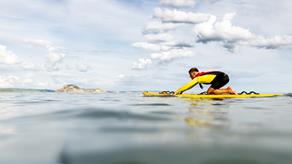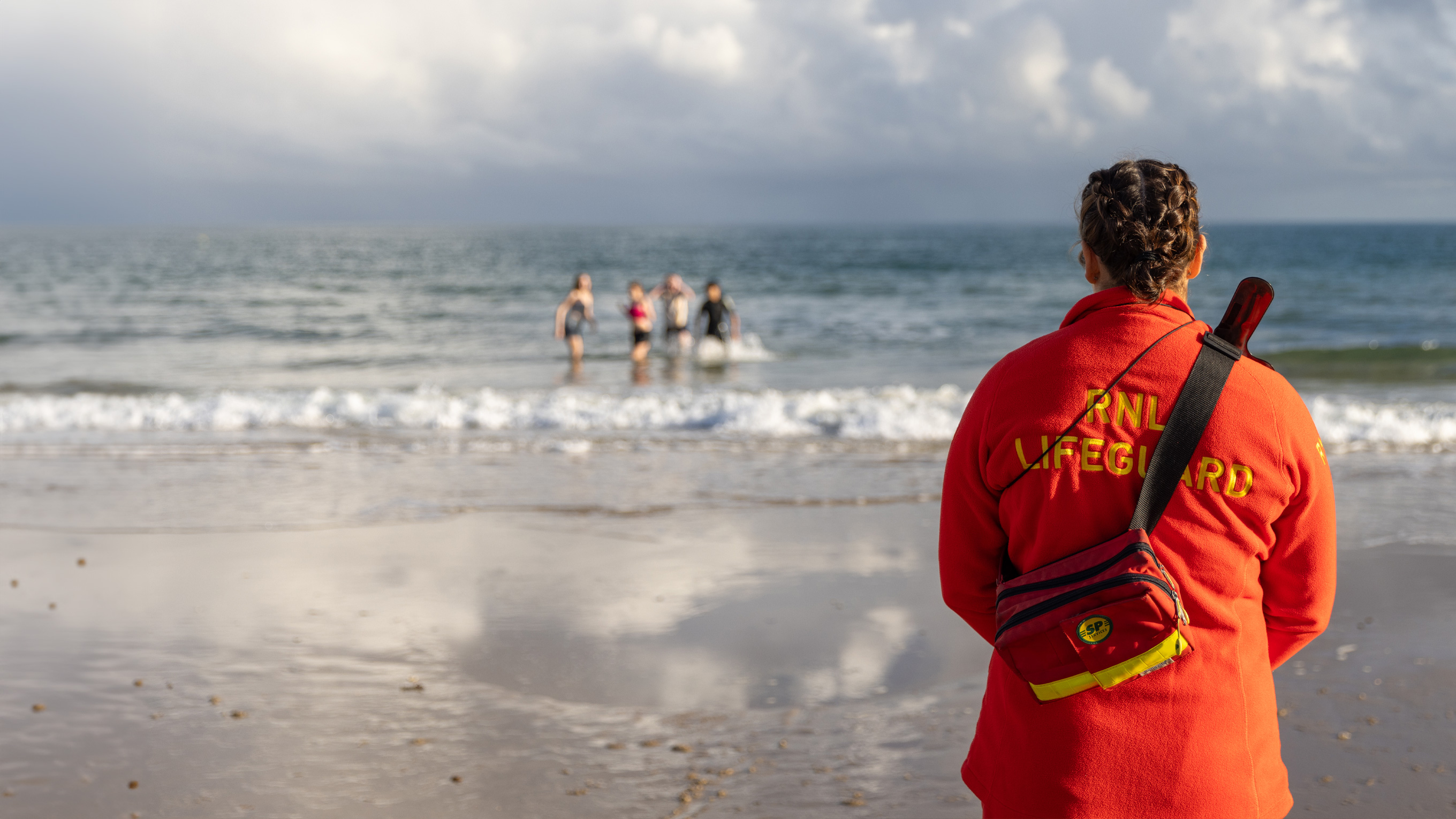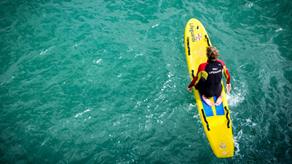

Requirements and training
How to qualify as a lifeguard
We have a few criteria you'll need to meet to become an RNLI lifeguard you must:
- Hold a National Vocational Beach Lifeguard Qualification (NVBLQ) or equivalent or ILS Beach/Surf Lifeguard qualification or equivalent. You can find out if your beach/surf lifeguard qualification is recognised on the ILS website.
- Take a health assessment (including an eyesight test) to ensure you are physically up to the job. This applies even if you've worked as an RNLI lifeguard before.
- Complete a 400m pool swim in under 7½ minutes, the first 200m of which must be completed in under 3½ minutes.
- Complete a 25m pool swim underwater and a 25m surface swim consecutively in under 50 seconds.
- Complete a 200m beach run in under 40 seconds.
- Be focused, vigilant, proactive and professional, with excellent people and rescue skills.
- Be approachable, someone who enjoys meeting people and helping them stay safe.
- Be a team player, get on well with other people, communicate easily and follow direction when required to.
- Be over 16 and of school leaving age (with the permission of parent/guardian, if under 18).
- Be willing to provide a DBS check or national/international equivalent.
Don’t quite meet the criteria yet? It may sound like a big ask, but we’ll be there every step of the way to help you get there – and become the best lifesaver you can be.
Read on to find out more and what your options are, depending on what stage you’re at.
Working towards your qualification? Apply to be a lifeguard now
If you've started the process of applying for a course or are currently registered on a course, you can still apply for a job (there's space on the application to tell us about this). Or you can keep scrolling to find out more about getting qualified.
Beach-based roles
Love the idea of working on the beach but want to stay on dry land? Or perhaps you’re just starting out on your journey to becoming a lifeguard? There are still ways to get involved and gain experience with one of our beach-based roles.
Find out about becoming a lifeguard volunteer supporting our teams on the beach, or explore our paid face-to-face fundraising roles.
Not sure how to get qualified?
You will need a National Vocational Beach Lifeguard Qualification (NVBLQ) to become a lifeguard.
An NVBLQ provides you with an introduction to all elements of beach lifeguard theory, cardiopulmonary resuscitation (CPR), first aid, pool skills and open water skills. It’s a physically demanding course and includes swimming to set times and lifting.
The NVBLQ comprises of a variety of units that you must successfully pass to attain the qualification. The courses are at least 40 hours long and are followed by a practical assessment.
If you don’t already have a NVBLQ, you can take a course to get the qualification.
RNLI-organised courses
The RNLI organises NBVLQ courses specifically for people who want to work as RNLI lifeguards. Here’s where and when the next courses are happening:
Course date and times: Mon 27 May – Fri 31 May, with an assessment day on Sat 1 June, daily 9am – 5pm
Brief course overview: Rescue techniques, core skills, fitness sessions, classroom sessions, first aid.
Location: Weston Bay, North Somerset.
Course title: SLSGB National Vocational Beach Lifeguard Qualification.
Prerequisites: Applicants should be aged 16+ on the day of assessment, be able to swim 400m in under 8 minutes in a pool, run 200m in less than 50 seconds on soft sand, and be looking to apply to the local Sedgemoor RNLI beach lifeguard service.
Cost: C.£100 (including SLSGB membership, assessment fee and course manuals).
Contact: brett_schofield@rnli.org.uk
No suitable courses near you?
If there are no suitable RNLI courses near you, you can do the NVBLQ with one of the following bodies:
- Royal Life Saving Society UK (RLSS UK)
- Surf Life Saving GB (SLSGB)
- Surf Life Saving Wales (SLSA Wales)
For applicants outside the UK:
You will need an ILS Beach/Surf Lifeguard qualification or equivalent. You can find out if your beach/surf lifeguard qualification is recognised on the ILS website.
Health
Due to the physically challenging nature of the role, you are unlikely to be cleared to work operationally if you:
- Don't meet the RNLI’s requirements for visual acuity (see below)
- Have had laser eye surgery in the last 3 months
- Experience epileptic seizures or sudden disturbances of your state of consciousness
- Have had a coronary thrombosis (heart attack), have undergone heart surgery, have heart disease or other cardiac arrhythmias or conduction defects
- Have significantly raised blood pressure that's not well controlled with medication
- Need insulin treatment for diabetes
- Have had a stroke, or unexplained loss of consciousness
- Have had cranial surgery or a severe head injury with continuing impairment
- Have Parkinson’s Disease or Multiple Sclerosis
- Are being treated for mental illness or nervous problem
- Have experienced alcohol or drug dependence within the last 3 years
- Have profound deafness and cannot communicate clearly on the radio or telephone
- Have double or tunnel vision
- Have a condition that could affect your fitness to be in the water
- Have a bone or joint condition that may affect your mobility or cause pain.
- Have a condition that may affect bone strength or if you're on oral steroids.
NB Other conditions may require a case-by-case assessment with specialist advice. This includes conditions that may pose a risk to self through recurrence, effects of treatment, low resistance to infections, complications, disability, reduced exercise tolerance or severe breathlessness (such as cancers, endocrine, metabolic, blood or respiratory disorders and migraines), or conditions that may pose a risk to others (such as infections and blood-borne diseases).
Eyesight test
You're unlikely to meet the RNLI’s requirements for visual acuity if you:
- Are unable to read 6/6 in the better eye and 6/12 in the worst eye on the Snellen Chart from a distance of 6m, even with glasses or contact lenses.
- Are unable to read 6/24 in the better eye and 6/36 in the worst eye without glasses or contact lenses. Your corrected vision must be to 6/6, 6/12. You will be encouraged to wear visual aids when on duty, but they would not be required to be worn in the water.
- Have defects in your field of vision in either eye.
- Have evidence of any progressive disease in either eye, or suffer from any other eye condition which could limit vision either now or within the next 5 years.
NB If your uncorrected vision without glasses or contact lenses is 6/60, but you still meet 6/6, 6/12 corrected, then this is within the parameters of our ‘returner’ or ‘experienced’ lifeguard standards, however you may be required to undertake a functional assessment. A risk assessment will additionally have to be conducted and additional control measures may be applied to your appointment. This may limit the beaches you can work on or the equipment you may use. You’ll be required to wear visual aids when on duty and such aids should be able to be worn in the water.
We do offer other opportunities on the beach with fewer medical screening standards, if you feel the role of an RNLI lifeguard may not be the right one for you. Please consider roles such as Lifeguard Support, Operations Assistant (Lifeguards) or those within our Face-to-Face Fundraising Team.
If you’d like to talk to someone in more depth about our health screening policy prior to application, please contact our People Department in confidence at People_Admin@rnli.org.uk
Life as a lifeguard - a reality check
As a lifeguard, you may undertake arduous activities in hazardous conditions. You’ll operate in adverse weather and difficult sea states, you may respond to a challenging medical emergency or provide intensive casualty care for an injury, or you may take part in a prolonged search. You’re likely to feel pressure to save lives and ease distress.
You will be fully trained to handle the situations you’re going to face. This training isn’t just focused on saving other people’s lives, it’s focused on keeping you safe too. But that doesn’t mean you won’t find being a lifeguard physically and mentally challenging – even exhausting.
As well as the physical aspect, some situations can put extra pressure on family members. Some work may involve extraordinarily difficult circumstances, particularly when severe injury or loss of life is involved, support is available for both the individual and wider family members.
All lifeguard duties have been risk assessed and – where necessary – control measures have been incorporated into lifeguard operating procedures, fitness testing and training programmes. Supervision is provided to ensure that lifeguards comply with the operating procedures and that they meet the required fitness standards.
Our safeguarding commitment
The RNLI is committed to protecting the safety and wellbeing of children and vulnerable adults. Therefore, all lifeguards are required to undergo a criminal screening check for the safety and wellbeing of children and vulnerable adults – and also to protect the individual and the RNLI’s reputation as much as possible, should an allegation be made.
In view of the high level of contact that our lifeguards have with the public, the RNLI ensures that all applicants for lifeguard roles have made an appropriate criminal disclosure. Candidates applying for lifeguard posts are asked to complete an enhanced criminal record disclosure.
This is a recruitment formality which all offers of employment are conditional upon. Failure to provide a disclosure report will result in any offer being withdrawn or employment being terminated.
If you're a UK citizen you will be required to complete a Disclosure and Barring Service online application form (for England, Channel Islands and Wales), an Access NI application form (for Northern Ireland) or a Disclosure Scotland form (for Scotland).
If you're not a UK citizen and have spent little or no time working in the UK before you will need to provide us with your criminal record history which you can obtain from your local police service. If you've previously worked in the UK, you may also be required to complete a Disclosure and Barring Service, Access NI or Disclosure Scotland check as well as providing the police check. However, you will not be required to complete a new police check if you haven’t left the UK during the winter season – you will only need to follow the UK citizen checks as above, according to which area you're in.
Please note, if you have had a caution(s) or conviction(s), this doesn’t necessarily mean the RNLI will not employ you. Our decision will be based on the nature of your caution or conviction, and the circumstances surrounding it. We will, however, require details of the offence, caution or conviction and – if offered employment – you won’t be able to commence employment until this information has been received and considered.
Similarly if, prior to the commencement of your seasonal contract, you're held, questioned, arrested, cautioned or charged with a criminal offence by the police – or receive a conviction – you're obliged to inform the RNLI immediately and any offer of employment made to you may be withdrawn.
To view the complete list of cautions and convictions as agreed by parliament that will never be filtered from a criminal record check, visit the gov website. We will take individual cases into consideration.
We will take individual cases into consideration.
Best practice
The RNLI is committed to safeguarding and promoting the welfare and wellbeing of children and vulnerable adults. We also recognise that safeguarding can be relevant to anyone; anyone can be vulnerable at any given time. We’re committed to complying with the Charity Commission definition to ensure the RNLI has ‘the range of measures in place to protect people in a charity, or those it comes into contact with, from abuse and maltreatment of any kind.’
In order to ensure we fulfil our pledge we acknowledge and understand that safeguarding is about:
- Supporting and protecting people;
- Not causing harm through our interactions;
- Being aware of people's wellbeing and welfare;
- Keeping each other and ourselves safe;
- Speaking out and taking appropriate action to prevent harm or abuse.
All lifeguards are expected to uphold this commitment. We take our responsibility very seriously and want to ensure the environments that we work in are as safe and happy as possible. The RNLI has a safeguarding policy, and guidance exists to help protect our children and adults at risk from harm and to provide a positive experience for them. It's the responsibility of all our lifeguards to be familiar with our safeguarding policy and accompanying procedures. As a representative of the RNLI, you are expected to consistently display high standards of personal behaviour and appearance.
It is a requirement of the RNLI's Code of Conduct to “comply with the requirements of our Safeguarding policy”.
Below is a guide to how you should conduct yourself and promote best practice, as a lifeguard and representative of the RNLI.
Safe Behaviours
You will always do the following:
- Put the safety and welfare of the child or adult at risk first.
- Work in an open environment, avoiding situations where you're on your own with a child or vulnerable adult. If such a situation is ever unavoidable, this must be with the full knowledge and consent of your line manager and the parent, guardian or carer of the individual. You should also avoid transporting children or vulnerable adults alone in a vehicle without full consent from the above people.
- Ensure children are with a parent or adult who legally assumes parental responsibility at all times when at an RNLI location, including when responding to an emergency call.
- Treat all children and adults at risk equally, with respect and dignity and build balanced relationships, enabling them to share in any decision-making process.
- Ensure that if any form of physical support is required, this is done openly and visibly, according to guidelines and with the consent of the individual and their parent/carer.
- Be an excellent role model – this includes not smoking, drinking or using inappropriate language in front of children or vulnerable adults. (This applies both within your working environment and in a social context.)
- Avoid communicating with children and vulnerable adults by phone, mobile, text, letter or email.
You will never do the following:
- Engage in rough, physical or sexually provocative games.
- Allow or engage in any form of inappropriate touching.
- Make sexually suggestive comments to a child or adult at risk.
- Take children/adult at risk to your home where they will be alone with you.
While physical contact with children and vulnerable adults may be appropriate as part of a lifeguard’s normal duties (such as in a rescue situation, when administering first aid or when protecting a casualty) it should be avoided in any other situation. This also applies in a social or communication context where professional boundaries must be maintained at all times.
Equality, Inclusion & Diversity Statement
Our staff and volunteers have been saving lives at sea without prejudice for nearly 200 years. We respect and value diversity of background, skills and perspectives within our teams, and consider it essential to help us deliver a world-class lifesaving service. We are an inclusive organisation and welcome applications from everyone. In addition to having the skills needed for the role, we also look for applicants who share our commitment to living our RNLI values (trustworthy, courageous, selfless, and dependable), and helping us work towards Our Vision: To save Every One.
Stay in touch
Following the RNLI on social media is a great way to keep in touch – especially out of season. Find the links at the bottom of this page.
Want to know more?

